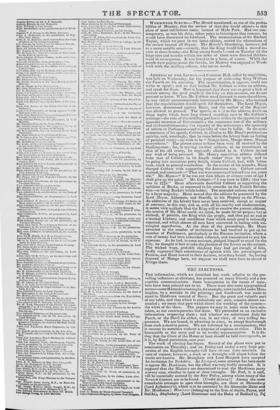ADDRESS or TILE LIVERY.—A Common Hall, called by requisition, was
held on Wednesday, for the purpose of addressing King William the Fourth on his accession. The requisitionists, it appears, could not write or speak ; and so they invited Mr. Cobbett to write an address, and speak for them. How it happened that there was so great a lack of orators among the good people of the City on this occasion, we do not pretend to know. When Mr. Cobbett stood forward to move the address, he was rather unceremoniously interrupted by Mr. Hunt ; who insisted that the requisitionists should speak for themselves. The Lord Mayor, however, determined against Hunt, and the author of the Register was allowed to proceed. The speech, as w ell as the address, dwelt on. those topics which have long formed standing ones in Mr. Cobbett's writings—the ruin of the middling and lower orders by the oppressive and ignorant measures of Government ; the enormous cost of the military and civil establishments ; the rapacity of the aristocracy ; the necessity of reform in Parliament—and especially of vote by ballot. In the com- mencement of his speech, Cobbett, in allusion to Mr. Hunt's pertinacious activity, said, sneeringly, that he came before the Livery from no feeling of personal vanity—no wish to be " Mungo here, Mungo there, Mungo everywhere." The phrase seems to have been very ill received by the blacking-man ; for, in moving another address, as an amendment to that of his old crony, he repeatedly alluded to it. Cobbett denied any wish of being personal. Mr. Hunt's opposition address differed from that of Cobbett in its length rather than its spirit, and in its going into numerous petty details, where Cobbett had, with better taste, stuck to general conclusions. In the course of his remarks, Hunt charged Cobbett with supporting the American war. Cobbett seemed amazed, and answered—" That war was commenced before I was ten years old." Mr. Hunt—" If he was not then fifteen or sixteen years of age I shall give up the point." Mr. Cobbett—" I was born in 17GG ; that war was in 1775." Hunt afterwards described Cobbett as supporting the opinions of Burke, as expressed in his remarks on the French Revolu- tion—as being Burke's bottle-holder. The amended address was carried by a large majority. Hunt moved that the address be presented by the Lord Mayor, Aldermen, and Sheriffs, to his Majesty on the Throne. As addresses of the Livery have never been received, except as matter of courtesy, in this way, and as, with all his suavity and condescension,, it seems very-Unlikely that the King will so receive the present addreis; the motion Of Mr. Hunt could, we think, be made for no purpose but to embroil, if possible, the King with the people, and thus put an end to a Mutual kindness and confidence from which much good is rationally expected, and which almost all men have concurred in hailing with un. mingled approbation. At the close of the proceedings, Mr. Hunt adverted to the number of invitations he had received to put up for member of Parliament, particularly to the Peeston invitation, where a sum of money had been subscribed, collected, and transmitted to pay his expenses. As he bad, in some measure, pledged himself to stand for the City, he thought it best to take the pleasure of the Livery on the subject. The wicked wags, probably thinking they had got enough of him, loudly expressed their concurrence of opinion with the potwallopers of Preston, and Hunt bowed to their decision, as in duty bound. So, having disposed of Mungo here, we suppose we shall next have to attend to Mungo there.


























 Previous page
Previous page